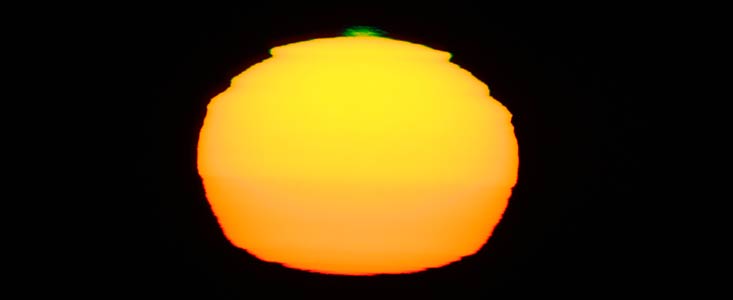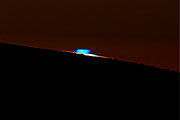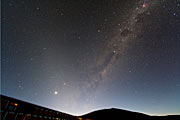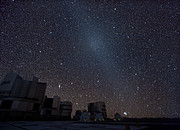Press Release
Solar Games at Paranal
ESO Staff Share Stunning Images of Solar Phenomena
2 May 2008
Cerro Paranal, home of ESO's Very Large Telescope, is certainly one of the best astronomical sites on the planet. Stunning images, obtained by ESO staff at Paranal, of the green and blue flashes, as well as of the so-called 'Gegenschein', are real cases in point.
The Earth's atmosphere is a gigantic prism that disperses sunlight. In the most ideal atmospheric conditions, such as those found regularly above Cerro Paranal, this will lead to the appearance of so-called green and blue flashes at sunset. The phenomenon is so popular on the site that it is now the tradition for the Paranal staff to gather daily on the telescope platform to observe the sunset and its possible green flash before starting their long night of observations.
The green and blue flashes are fleeting events that require an unobstructed view of the setting Sun, and a very stable atmosphere. These conditions are very often met at Paranal, a 2635m high mountain in the Chilean Atacama Desert, where the sky is cloudless more than 300 days a year. Paranal is home of ESO's Very Large Telescope, an ensemble of four 8.2-m telescopes and four 1.8-m Auxiliary Telescopes that together form the world's most advanced optical telescope.
ESO staff Stéphane Guisard has been chasing green flashes for many years and has been able to capture them on many occasions. The picture shown above is one of many examples from his collection. "The most challenging is to capture the green flash while still seeing the rest of the Sun with all its colours," says Guisard. His colleague Guillaume Blanchard was even luckier. On Christmas Eve, as he was one of the few to follow the tradition of looking at the sunset, he had the chance to immortalise a blue flash using his hobby telescope.
ESO astronomer Yuri Beletsky also likes to take photographs from Paranal, but he prefers the night views. This allows him to make use of the unique conditions above the site to make stunning images. On some of these, he has captured other extremely interesting effects related to the Sun: the so-called Zodiacal light and the 'Gegenschein'.
Both the Zodiacal light and the Gegenschein (which is German for "counter shine") are due to reflected sunlight by interplanetary dust. These are so faint that they are only visible in places free from light pollution.
Most of the interplanetary dust in the Solar System lies in the ecliptic, the plane close to which the planets are moving around the Sun, and the Zodiacal light and Gegenschein are thus seen in the region centred around the ecliptic. While the Zodiacal light is seen in the vicinity of the Sun, the Gegenschein is seen in the direction opposite to the Sun.
Each of the small particles of dust, left over from comets and asteroids, acts as a small Moon reflecting the light coming from our host star. "If you could see the individual dust particles then you would see the ones in the middle of the Gegenschein looking like very tiny full moons, while the ones hidden in the faint part of the dust band would look like tiny crescent moons," explains ESO astronomer Colin Snodgrass. "But even the VLT cannot see such tiny individual dust particles out in space. Instead we see the combined effect, in photos like these, of millions of tiny dust particles reflecting light back to us from the Sun."
Contacts
Stéphane Guisard
ESO
Chile, Chile
Email: sguisard@eso.org
Guillaume Blanchard
ESO
Chile, Chile
Email: gblancha@eso.org
Yuri Beletsky
ESO
Chile, Chile
Email: ybialets@eso.org
About the Release
| Release No.: | eso0812 |
| Legacy ID: | PR 12/08 |
| Name: | Sun |
| Type: | Milky Way : Sky Phenomenon : Night Sky : Zodiacal Light Milky Way : Sky Phenomenon : Night Sky : Zodiacal Light : Gegenschein Milky Way : Sky Phenomenon : Light Phenomenon : Sunrise-Sunset : Green flash |
| Facility: | Very Large Telescope |
Our use of Cookies
We use cookies that are essential for accessing our websites and using our services. We also use cookies to analyse, measure and improve our websites’ performance, to enable content sharing via social media and to display media content hosted on third-party platforms.
ESO Cookies Policy
The European Organisation for Astronomical Research in the Southern Hemisphere (ESO) is the pre-eminent intergovernmental science and technology organisation in astronomy. It carries out an ambitious programme focused on the design, construction and operation of powerful ground-based observing facilities for astronomy.
This Cookies Policy is intended to provide clarity by outlining the cookies used on the ESO public websites, their functions, the options you have for controlling them, and the ways you can contact us for additional details.
What are cookies?
Cookies are small pieces of data stored on your device by websites you visit. They serve various purposes, such as remembering login credentials and preferences and enhance your browsing experience.
Categories of cookies we use
Essential cookies (always active): These cookies are strictly necessary for the proper functioning of our website. Without these cookies, the website cannot operate correctly, and certain services, such as logging in or accessing secure areas, may not be available; because they are essential for the website’s operation, they cannot be disabled.
Functional Cookies: These cookies enhance your browsing experience by enabling additional features and personalization, such as remembering your preferences and settings. While not strictly necessary for the website to function, they improve usability and convenience; these cookies are only placed if you provide your consent.
Analytics cookies: These cookies collect information about how visitors interact with our website, such as which pages are visited most often and how users navigate the site. This data helps us improve website performance, optimize content, and enhance the user experience; these cookies are only placed if you provide your consent. We use the following analytics cookies.
Matomo Cookies:
This website uses Matomo (formerly Piwik), an open source software which enables the statistical analysis of website visits. Matomo uses cookies (text files) which are saved on your computer and which allow us to analyze how you use our website. The website user information generated by the cookies will only be saved on the servers of our IT Department. We use this information to analyze www.eso.org visits and to prepare reports on website activities. These data will not be disclosed to third parties.
On behalf of ESO, Matomo will use this information for the purpose of evaluating your use of the website, compiling reports on website activity and providing other services relating to website activity and internet usage.
Matomo cookies settings:
Additional Third-party cookies on ESO websites: some of our pages display content from external providers, e.g. YouTube.
Such third-party services are outside of ESO control and may, at any time, change their terms of service, use of cookies, etc.
YouTube: Some videos on the ESO website are embedded from ESO’s official YouTube channel. We have enabled YouTube’s privacy-enhanced mode, meaning that no cookies are set unless the user actively clicks on the video to play it. Additionally, in this mode, YouTube does not store any personally identifiable cookie data for embedded video playbacks. For more details, please refer to YouTube’s embedding videos information page.
Cookies can also be classified based on the following elements.
Regarding the domain, there are:
- First-party cookies, set by the website you are currently visiting. They are stored by the same domain that you are browsing and are used to enhance your experience on that site;
- Third-party cookies, set by a domain other than the one you are currently visiting.
As for their duration, cookies can be:
- Browser-session cookies, which are deleted when the user closes the browser;
- Stored cookies, which stay on the user's device for a predetermined period of time.
How to manage cookies
Cookie settings: You can modify your cookie choices for the ESO webpages at any time by clicking on the link Cookie settings at the bottom of any page.
In your browser: If you wish to delete cookies or instruct your browser to delete or block cookies by default, please visit the help pages of your browser:
Please be aware that if you delete or decline cookies, certain functionalities of our website may be not be available and your browsing experience may be affected.
You can set most browsers to prevent any cookies being placed on your device, but you may then have to manually adjust some preferences every time you visit a site/page. And some services and functionalities may not work properly at all (e.g. profile logging-in, shop check out).
Updates to the ESO Cookies Policy
The ESO Cookies Policy may be subject to future updates, which will be made available on this page.
Additional information
For any queries related to cookies, please contact: pdprATesoDOTorg.
As ESO public webpages are managed by our Department of Communication, your questions will be dealt with the support of the said Department.




